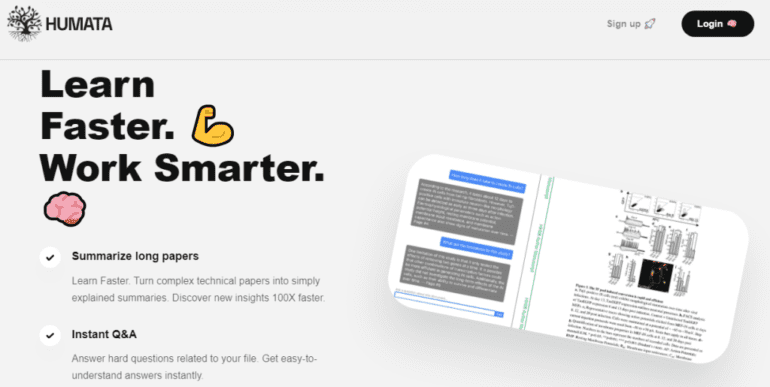TL;DR:
- Cyrus Khajvandi, a Stanford graduate and entrepreneur, developed Humata AI to simplify document management.
- Humata AI, launched in February, quickly gained popularity, processing millions of pages of files.
- The platform secured $3.5 million in funding from investors, including Google’s Gradient Ventures.
- Humata AI allows users to ask questions about their files, especially PDFs, and receive instant answers.
- It serves a diverse clientele, including academics, legal professionals, and those in customer support.
- While other AI chatbots offer file analysis, Humata’s focus and robustness set it apart.
- Khajvandi assures data privacy through rigorous training and safeguards.
- Humata AI plans to use its $3.58 million funding to enhance AI capabilities and expand its market reach.
Main AI News:
In the world of document management, Humata AI, spearheaded by Cyrus Khajvandi, a Stanford biology graduate and seasoned entrepreneur, has emerged as a game-changer. Balancing the demands of scientific research with daily work responsibilities can be an arduous task, and Khajvandi recognized this challenge was widespread. Leveraging the growing accessibility of AI technology, he embarked on a mission to develop an AI platform that would revolutionize the way documents, especially scientific studies, are summarized and questions are answered.
Enter Humata AI, which made its debut in February, with the notable addition of Dan Rasmuson, former Labelbox founder, as its CTO. The platform wasted no time gaining momentum, processing an impressive volume of tens of millions of pages of files. It swiftly amassed a user base numbering in the millions and secured a significant funding injection of $3.5 million from prominent investors, including Google’s Gradient Ventures, ARK Invest, and M13.
Khajvandi, in an email interview with TechCrunch, articulated the mission of Humata AI, stating, “Our mission at Humata is to empower people and organizations to make smarter and faster decisions by being able to ask questions across all their files.” He likened Humata to [OpenAI’s] ChatGPT but tailored for all your files.
The brilliance of Humata lies in its simplicity. It allows users to pose questions about their files, primarily PDFs, and receive prompt answers. Users can effortlessly upload one or more PDFs and inquire about their content. Khajvandi emphasized that Humata’s clientele includes not only academics but also professionals in fields such as law, oil and gas, and customer support.
While there are other chatbots, like ChatGPT and Anthropic’s Claude, offering file-analyzing features, Khajvandi contends that Humata stands out due to its focused functionality and enhanced robustness. “People can ask AI any question and get the answer from their own data instantly with highlighted references,” he said. “This is possible because of the recent advancements in AI enabling every worker to get instant answers to their questions.“
Nonetheless, it’s important to acknowledge that AI doesn’t always excel at summarization. Fast Company, in a test of ChatGPT’s summarization capabilities, found instances where the model got content wrong, omitted key information, or even fabricated facts not present in the source documents.
Privacy concerns also loom large. Companies and individual users may be hesitant to upload their sensitive documents to Humata’s platform for processing. Khajvandi reassures users by highlighting Humata’s rigorous approach to training models on diverse datasets and testing them for bias. He stressed that Humata only collects essential data and has stringent safeguards in place to prevent unauthorized access. “We ensure informed consent, helping users understand what they’re agreeing to,” Khajvandi added. “As our AI systems advance, we’re careful not to infer sensitive information without explicit permission. We adhere to legal and ethical standards across different regions and cultures, making Humata enterprise-ready.”
Having already garnered thousands of customers on its paid plan, Khajvandi disclosed that Humata plans to allocate its raised capital, totaling $3.58 million, toward bolstering its AI capabilities, enhancing the user experience, and expanding its market presence. Khajvandi explained, “We chose to raise now because we’ve seen a growing demand for efficient, AI-driven solutions in synthesizing insights from vast volumes of enterprise files. The funds will help us develop new features, refine our existing products, and expand into new markets, ultimately empowering businesses to make better and faster decisions with their private data using Humata.”
Conclusion:
Humata AI’s emergence signifies a growing demand for efficient AI-driven document management solutions. Its ability to empower users to make smarter decisions by quickly extracting insights from vast volumes of files positions it as a valuable player in the document management market. As AI technology advances, Humata AI’s commitment to data privacy and accuracy bodes well for its enterprise-ready future.

